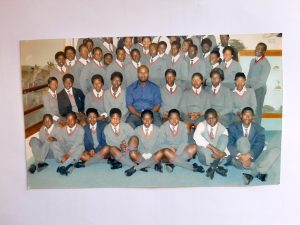Qualification
I hold a doctorate in sociolinguistics with a focus on language teaching and learning.
https://orcid.org/0000-0002-4148-4385
Teaching & Learning Experience
I have taught a range of English modules in teacher training programs using a multi-modal delivery method at the undergraduate and graduate levels in senior/further education institutions. Regarding functional and subject-related experience, such as primary and/or secondary teaching and tertiary experience: I’ve been teaching English in classrooms for well over 23 years, and /or 5 years of higher education.
In Japan, below- at the University of Toyama
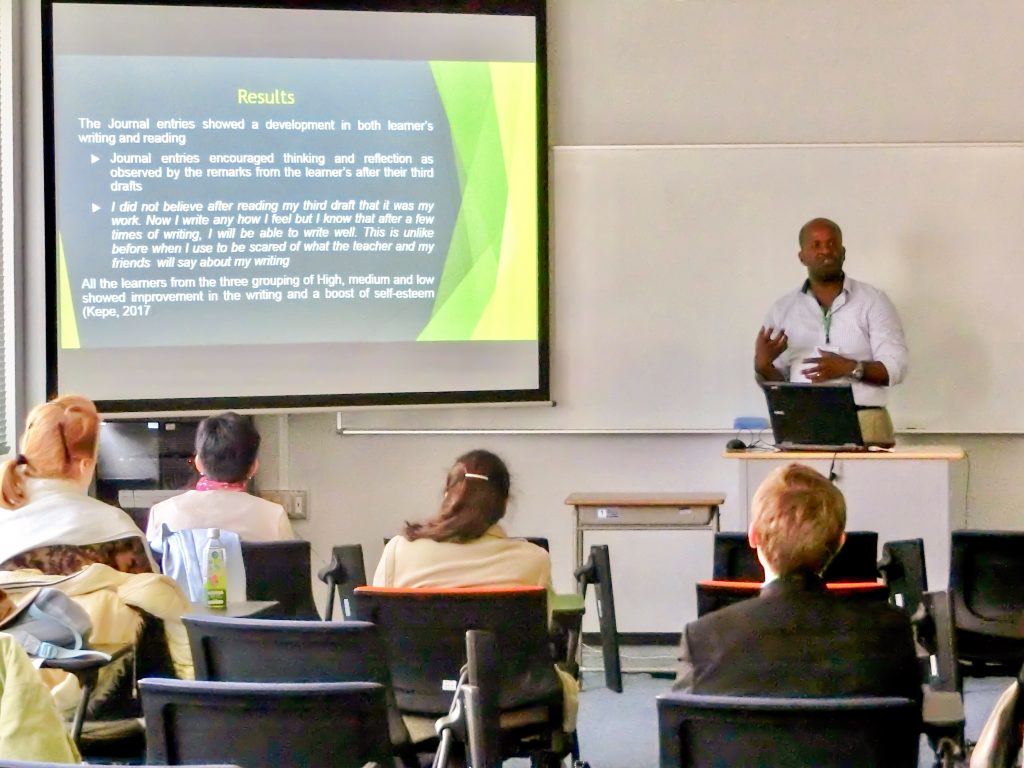
to be heard by the best researchers.
Skills and expertise
I have conducted research in the areas of language education: reading and writing techniques, methodology, and the integration of theory and practice. Language acquisition in conflict zones, interdisciplinarity, transcultural and translingual practices, communicative competence, and process and text-based genre approach, connecting “third space”, a ground-breaking construct, and how it aids students in creating new local contexts and identities are covered. So to say, a commonality where there is a transforming space and there is a greater opportunity for extended learning and the creation of new information.
In the latest UFH News:
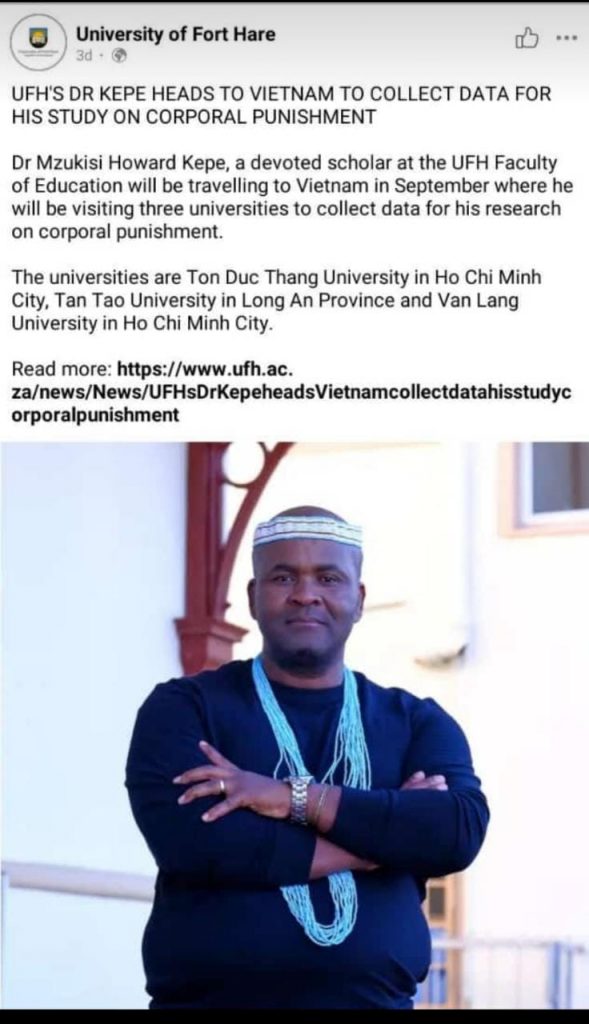
Community Engagement and Service Learning
I’ve been actively contributing to the growth of community-based research by creating and modifying service learning modules. The Bulembu and recently added Bulembu L & H Primary School’s literacy and extensive reading project are one such community-based research endeavour, both situated 10-12 kilometres away from King William’s Town District, in the Province of the Eastern Cape, South Africa.
The photo below, (left) depicts the launch of the Bulembu extensive reading project.
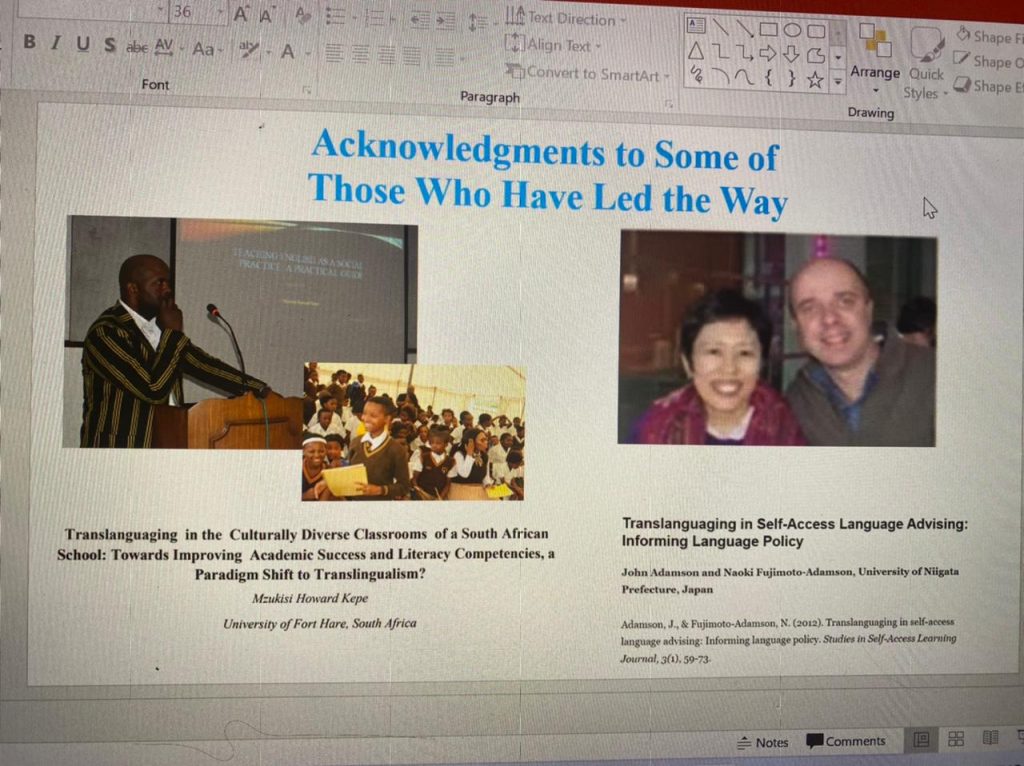
John Adamson and his wife Fujimoto-Adamson,
courtesy of my scholar friend Dr John Baker, at Ton Duc Thang University in Vietnam
Thanks to the Bulembu’s extensive reading and successful launch, in which quite a few people were invited from nearby schools, the second of which is Bumbanani L & H Primary School, e-Quzini, also a neighbourhood of King Williams Town. The shift from “learning to read to reading to learn” is central to our long-term literacy endeavour.
My effort to develop a learner identity through literature is also related. fostering a culture of reading for pleasure is also very important.
Chris Weagle, a Canadian expatriate who teaches at the American University of Sharjah, United Arab Emirates, one of the best universities in the Gulf, is listed among my sponsors who gave money to the ER project.
The article “It Starts with a Story! Towards Extensive Reading,” written by me and Chris Weagle, was published in English Scholarship Beyond Borders Volume 6, Issue 1.
Additionally, I want to thank Biblionef from Cape Town for supporting my initiative with top-notch modern fiction and nonfiction books at my request. The Bibionef has given both schools—Bulembu and Bumbanani L/H Primary Schools—two boxes of modern, appealing, and age-appropriate literature. See book display/s below:
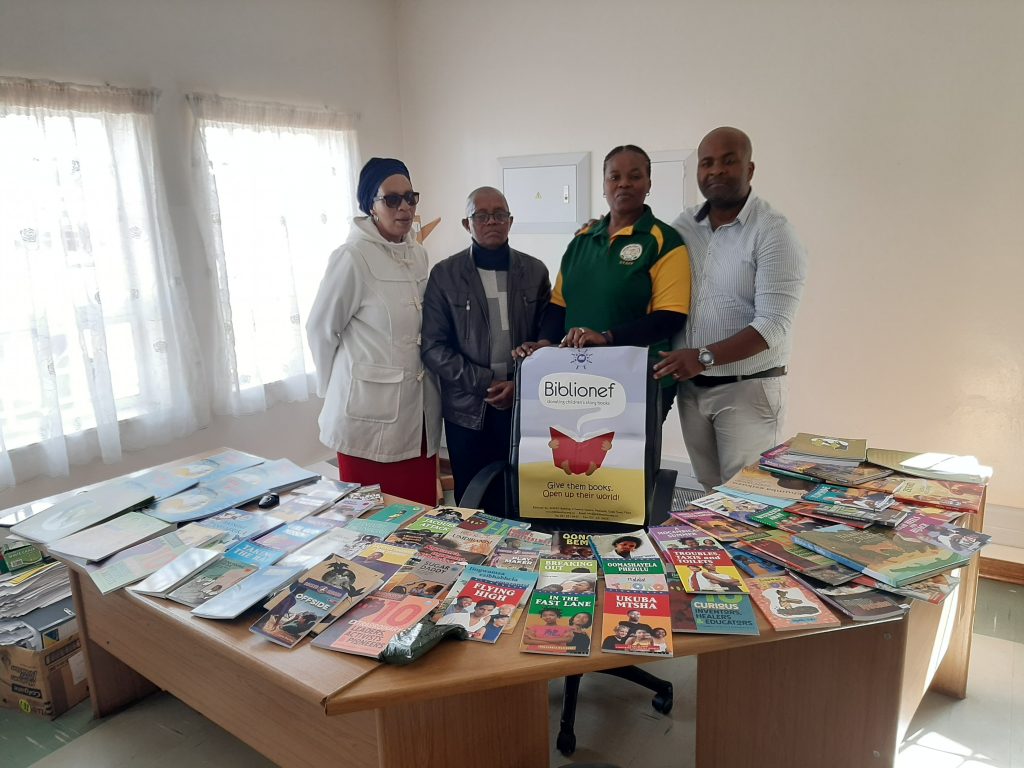
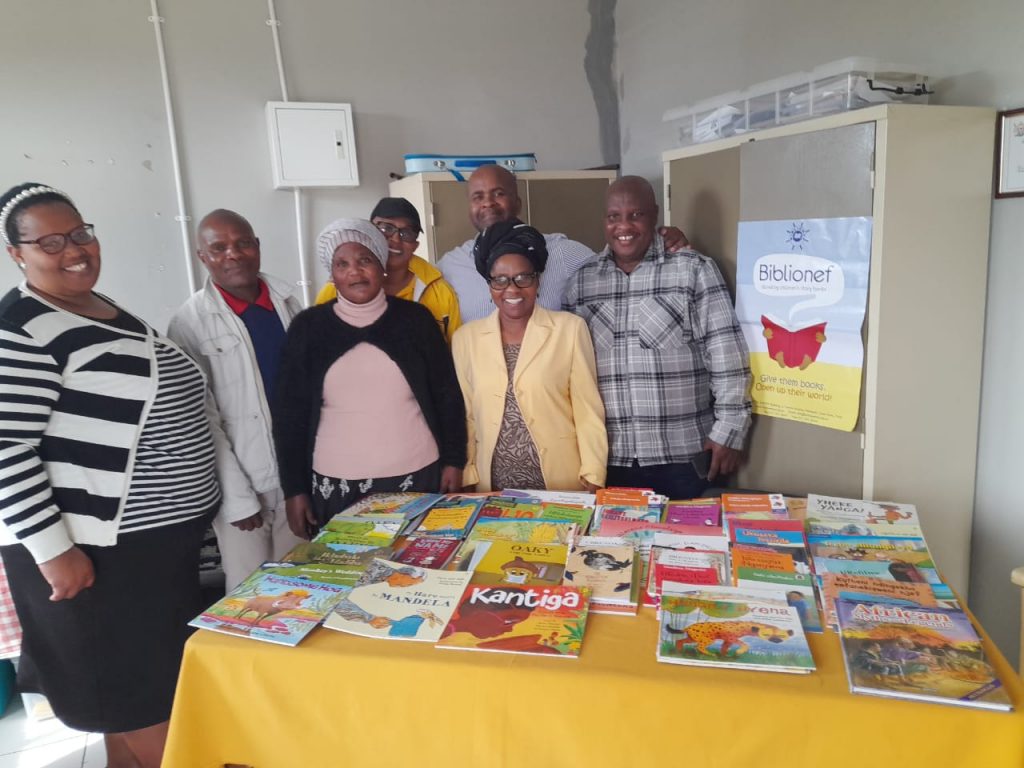
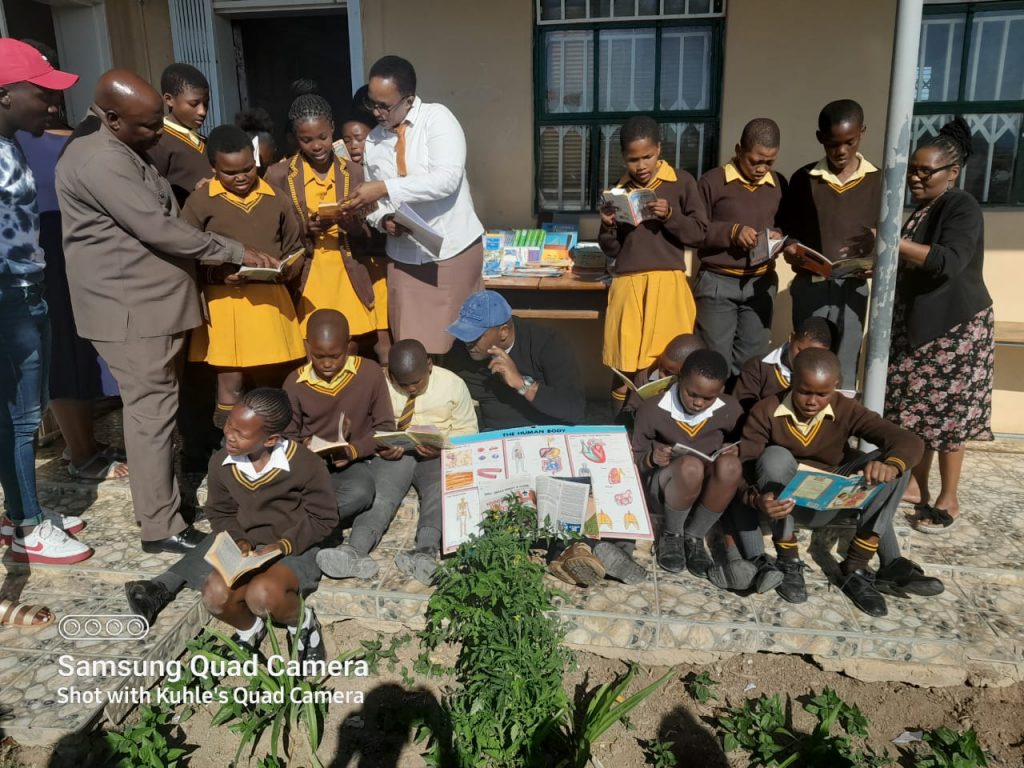
are in the middle, and I am sitting on the far right, scaffolding reading with the learners.
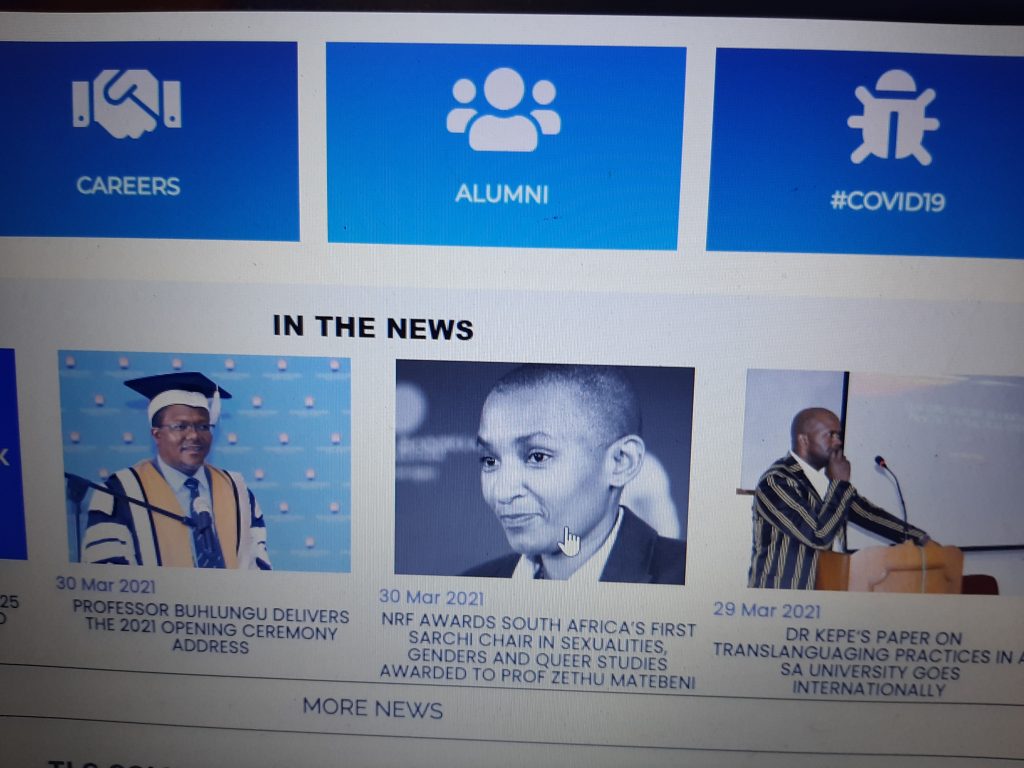
I am a dedicated, enthusiastic, and strong emerging academic in the field of education. I am a reflective practitioner, committed to stimulating curiosity in students while facilitating learning.
My role is evidenced by my impressive publications, but also my influence in
scholarship through various local and international bodies such as the ESBB and
the journal of education and educational development of Pakistan &
Malaysia.
I have a long history of successful teaching, including experience teaching
literacy that has resonated beyond my local context. I have developed
award-winning extensive reading projects in local schools where extensive
reading in English was under-resourced.
I have a hands-on knowledge of the development of literacy that is so essential
at all stages of education. I have gained invaluable experience in teaching and
providing feedback in large classes across a variety of contexts. I have also
had solid experience in lecturing to B.Ed and Honours students. I am an energetic and
enthusiastic presenter and teacher who inspires students.
As a scholar, I have an impressive emerging record destined for a successful
future. This optimal balance between teaching and scholarship is an important
asset. As a teacher/scholar, I have also published in several other relevant
areas. I can work independently, with a clear agenda of self-improvement.
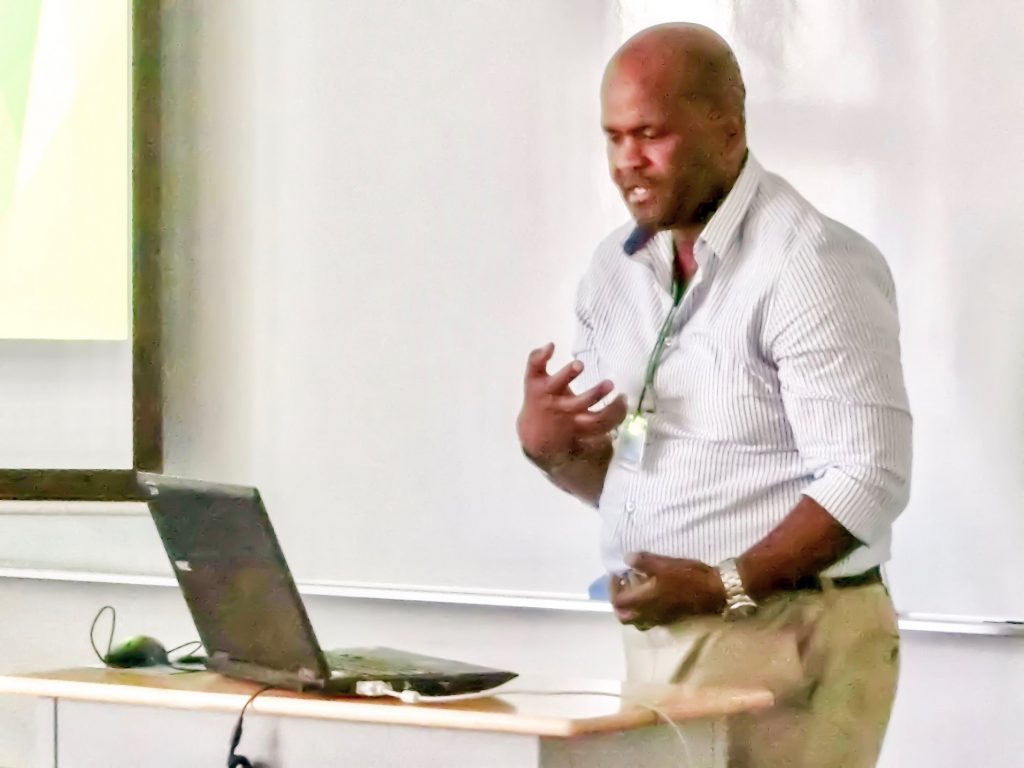
the University of Toyama, in Japan
Current Occupation –
I work at the Cape Peninsula University of Technology where I teach research, professional and technical communication skills. I am a senior lecturer.
I am in India below, in 2019 at KMV, presenting my paper: Teaching English as Social Practice: A Practical Guide!
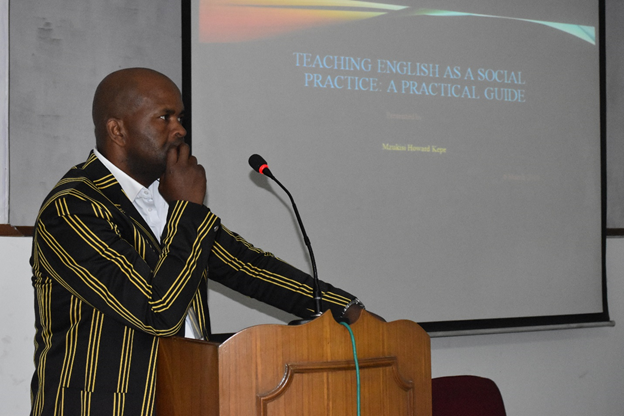
It Starts with a Story! is the title of the Bulembu Lower & Higher Primary School teaching and learning community research project. Towards Extensive Reading!
The context for my extensive reading project”
The findings of the PlRLS in primary school (PIRLS, 2006–2011 & 2016–18), successively and recently in 2021 (PIRLS, 2021), all indicate that literacy rates in South African schools are egregiously low. This trend was a source of worry for me and ultimately led to the development of my ER community teaching and learning project, which I discussed in my presentation above in Northern India, Jalandhar.
My emergency visit to both the aforementioned underprivileged neighbourhood schools detailed above was brought about by the motivational disconnect that both students and teachers in that district faced.
Photos below showing the day of the Bulembu ER launch, 24 October 2019

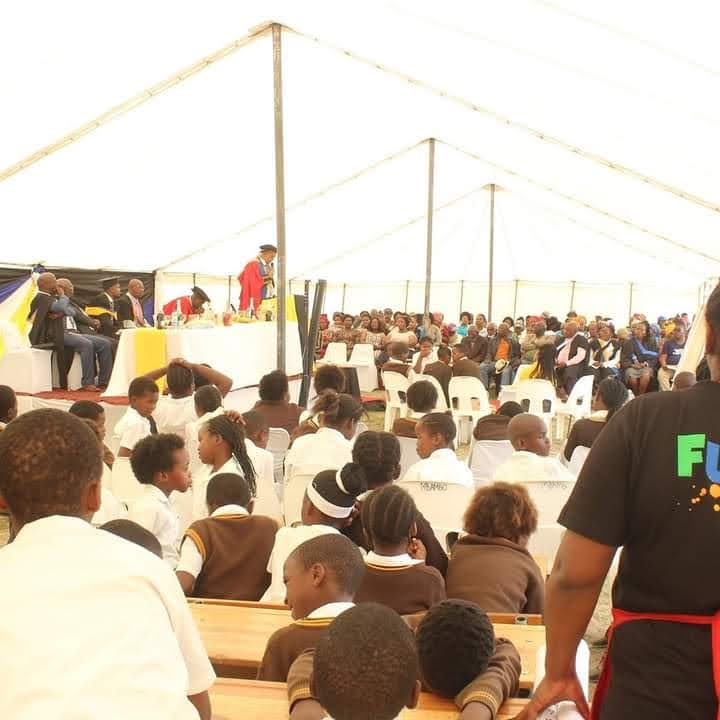
One of our ER tutors in a black T-Shirt ushering on the day of the launch, 24/10/2019.


In India and elsewhere, I presented this teaching and learning community-based literacy research project about South African school/s [Bulembu and Bumbanani] in a district with pervasively low literacy rates (Kepe and Weagle, 2020).
The UFH’s GMRDC and my academic friend Chris Weagle became involved as a result of my impassioned analysis by providing financial support to the “literacy tutors”, who served as our foot soldiers because we weren’t always on the ground. (I only visited the site twice a week).
The learners at Bulembu L & H Primary School, in particular, emphasized their love of football because it brought them together and gave them a sense of community. Their football team brought power from their language and their land, yet they were marginalized by not being able to read and write in English.
As I described interview data in India, I correlated the lack of a school library to low reading performance and low motivation (motivational disconnect). I hypothesized that a library and a regimented reading program that prioritized reading for pleasure could be a solution (Kepe and Weagle, 2020). Therefore, there was a need for an intervention, and that needed a bit of energy from my own teaching experience, or even more, to find a way to funnel it to those primary students.
I believe that most if not all teachers have faith that instilling genuine curiosity catalyzes learning, helping learners want to learn for the rest of their lives. In education, this process is known as learner-identity development through authentic learning.
I bring that energy to my teaching, to my students, and to my conference presentations: authentic, contagious, and inspiring. Not only had my ardent message been heard that day in India, but more than a few in the audience were left wondering about these students and teachers, and what it would take to address this type of problem.
In the months following my presentation in India, I hired and trained an indispensable team of what I called literacy tutors, and they, along with the school’s collaborative efforts, implemented an extensive reading program. Within a year, the ER as I fondly refer to it, has been a resounding success.
We provided a new library, along with computers and the internet (sponsored by my academic friend, Chris Weagle). As mentioned elsewhere, the project was staffed with tutors for reading, math, and computer literacy development.
Students who initially could not read or write in English were now reading novels, identifying literary themes, plots, settings, complications and resolutions. Their critical thinking abilities evolved with their literacy rates, and they have developed the ability to skim and scan, predict, and infer from context. Debate societies and book clubs have been established, and the ER program itself now extends into later grades, thereby ensuring that the first group has ongoing support, as with those who follow. Bulembu students’ scores are now much closer to the top of the district, and more recently, Bulembu Lower & Higher Primary School received the district award for excellence. Without a doubt, this work will be long-lasting and will inspire a new generation of students. It is through this type of meaningful impact that I unequivocally believe that my ability to inspire and teach using the same best practice that is central to my research track, will funnel across the educational contexts.
More photos of the Bulembu L/H launch


“The Burial of Sir John Moore”
Not a drum was heard, not a funeral note,
As his corse to the rampart we hurried;
Not a soldier discharged his farewell shot
O’er the grave where our hero was buried.
We buried him darkly at dead of night,
The sods with our bayonets turning,
By the struggling moonbeam’s misty light
And the lantern dimly burning.
No useless coffin enclosed his breast,
Not in sheet or in shroud we wound him;
But he lay like a warrior taking his rest
With his martial cloak around him.
Few and short were the prayers we said,
And we spoke not a word of sorrow;
But we steadfastly gazed on the face that was dead,
And we bitterly thought of the morrow.
We thought, as we hollowed his narrow bed
And smoothed down his lonely pillow,
That the foe and the stranger would tread o’er his head,
And we far away on the billow!
Lightly they’ll talk of the spirit that’s gone,
And o’er his cold ashes upbraid him —
But little he’ll reck, if they let him sleep on
In the grave where a Briton has laid him.
But half of our heavy task was done
When the clock struck the hour for retiring;
And we heard the distant and random gun
That the foe was sullenly firing.
Slowly and sadly we laid him down,
From the field of his fame fresh and gory;
We carved not a line, and we raised not a stone,
But we left him alone with his glory!
My doctoral thesis from 2017 is titled Building a Reading Culture Among Grade 12 Learners in an English First Additional Language Classroom: the Case of One High School in King Williams Town Education District, in the Eastern Cape, South Africa – 2017 the University of Fort Hare Number CLC: 1103916974, Information: xiv, 372 pages; 30 cm and I harvested It Starts with a Story from this immense work
The ESBB, Bugle and the @UFH News Edition, Weekly Institutional Advancement published the project.

Research techniques: I conducted my ER research project through resource-auditing, and pre-post case study interviews, providing plenty of opportunities to access reading materials that pupils enjoy reading in a relaxed atmosphere such as fairy tales, folk tales, novels, plays, poetry and media journals (print, audio & visual). The study generated video recordings, classroom corner libraries, translatability, book reports, continuous assessment, and long-term intrinsic motivation for reading.
Stakeholders involved:
The University of Fort Hare’s Govan Mbeki Research and Development Centre (GMRDC). A Canadian scholar and expatriate, from the American University of Sharjah, Chris Weagle. Cambridge University Press. The Eastern Cape Sports Recreation Arts & Culture.
The beneficiary, the Bulembu students, are sandwiched by the Cambridge University Press representative in the photo below. I am on the far left, and Mr Mgolombane, the school’s principal on the far right.

As a teacher/scholar, like John Unger, I am trying to catch the students’ attention and effectively engage them with the languages of our content areas. I believe such questions about the mind, language, and activity transcend borders.
In teaching philosophy, I value constructivism, being recognised for an interactive teaching style that stimulates curiosity and encourages student participation and enthusiasm while facilitating learning. I have a proven ability to leverage learning best practices and faculty collaboration to maintain teaching standards focused on a school-wide curriculum that enables students to compete globally. I am armed with keen attention to detail and an unswerving commitment to the highest standards of professional excellence. I subscribe to one of my mentors Prof. Monica Hendricks quote:
“… the best classroom resources in the world depend on teachers’ own subject and pedagogical knowledge to be used effectively.”
(Hendricks 2012, p31)
Scholarship, I have been participating subscribe to my mentor Prof. Roger Nunn’s philosophy of “Holism” [holistic approaches to English Language Teaching (ELT)] and language education broadly, in approaches that engage learners and colleagues as ‘whole’ people in lifelong learning and openness to other cultures.
I regularly support and serve as a mentor for junior academic staff, including mentoring student teachers and teachers in service. I participate in training and assessing student teachers for and during school-based work-integrated learning.
I have published wider across genres and reviewed quite several journal issues for the Journal of Education and Educational Development (JoEED) of Pakistan and the English Scholarship Beyond Borders respectively.
I am a lifelong learner and self-motivated
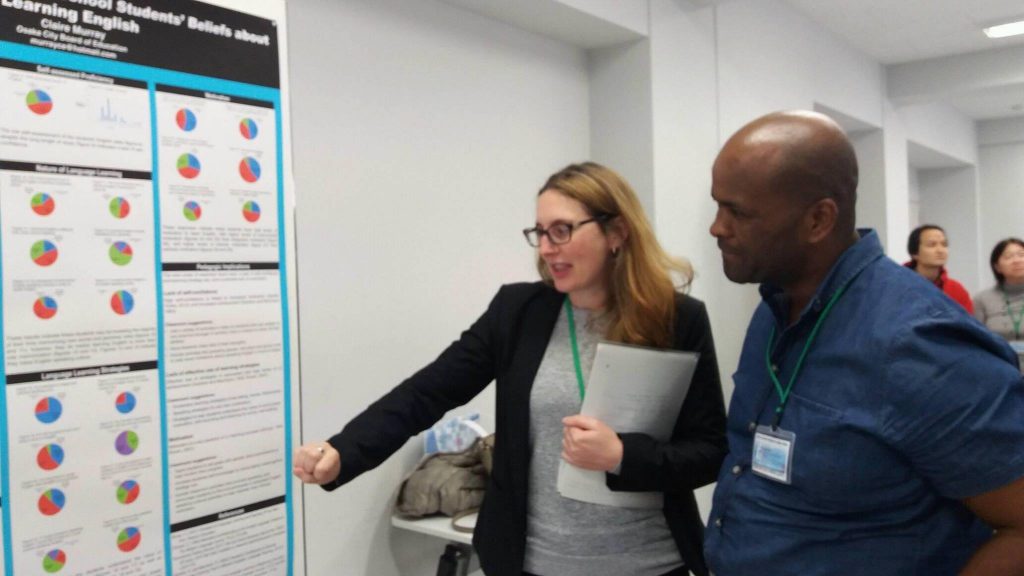
Selected international conferences are below:
I have given both virtual and face-to-face conference presentations, plenary sessions, talks and workshops in various countries:
Leeds Beckett University in England in the United Kingdom, Toyama University in Japan, Kanya Maha Vidyalaya College, Jalandhar, Punjab in Nothern India, Dokuz Eylül University Conference in Turkey and Palma de Mallorca in Spain, Dhofar University, Salalah in Oman-plenary and the IRCW-ELS 2021 University College of Yayasan Pahang, Malaysia (both virtual) upon a theme, Advanced teaching & research in English language education.
In the photo below I am presenting in 2019 at Toyama University in Japan on a theme: English Academic Writing in a Global World
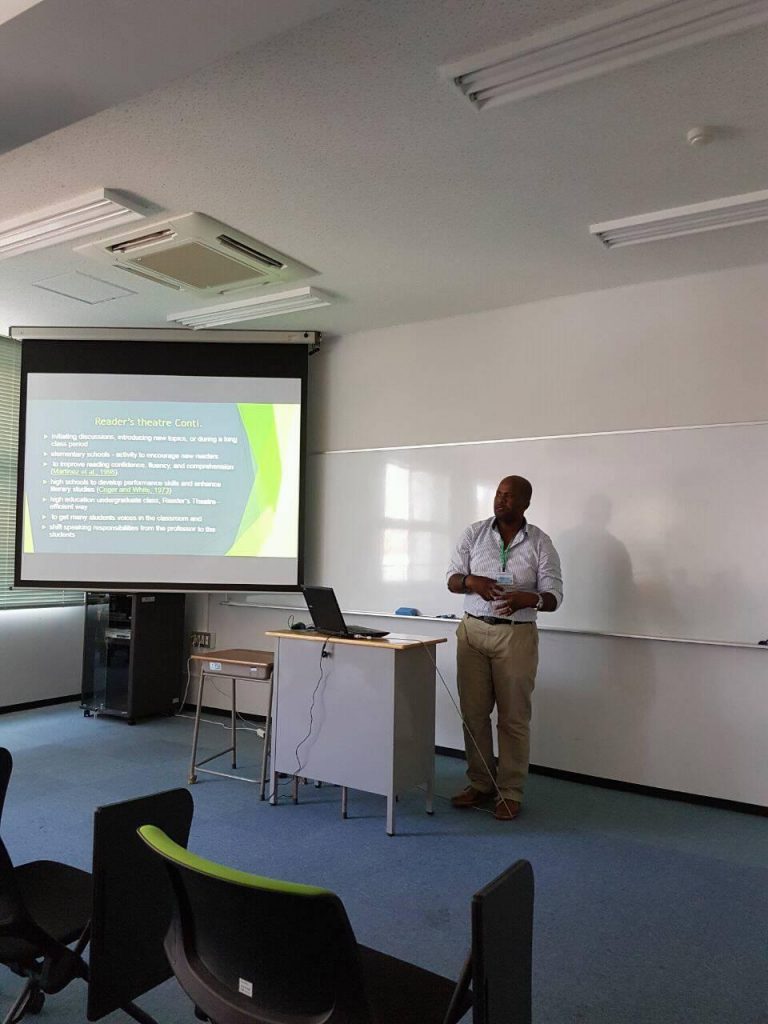
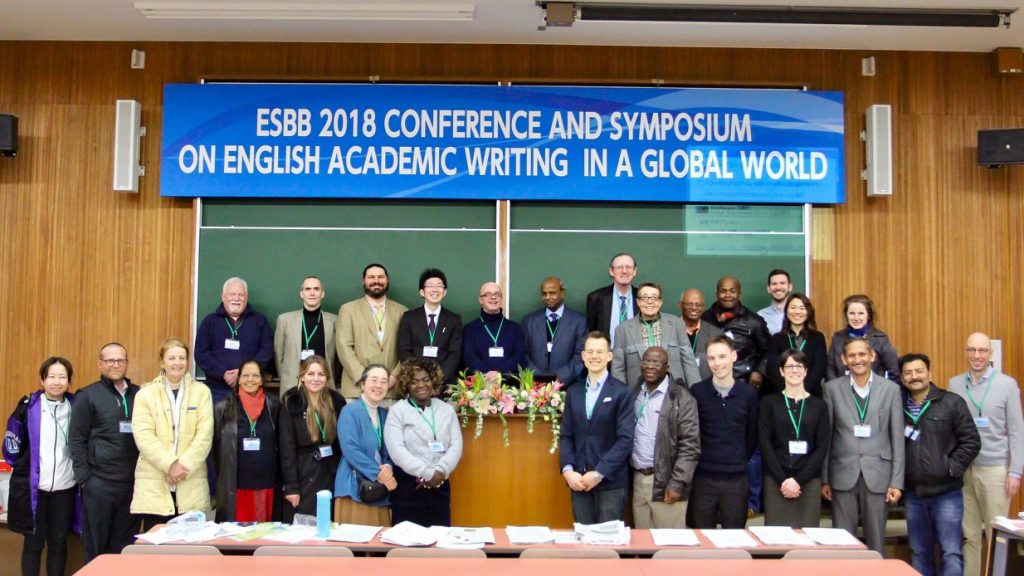
the University of Toyama showcasing its international conference
with the theme written on a blue board. I am standing behind
on the last row from the right-hand side, second from the tail end.
A Research Excellence Award Winner,
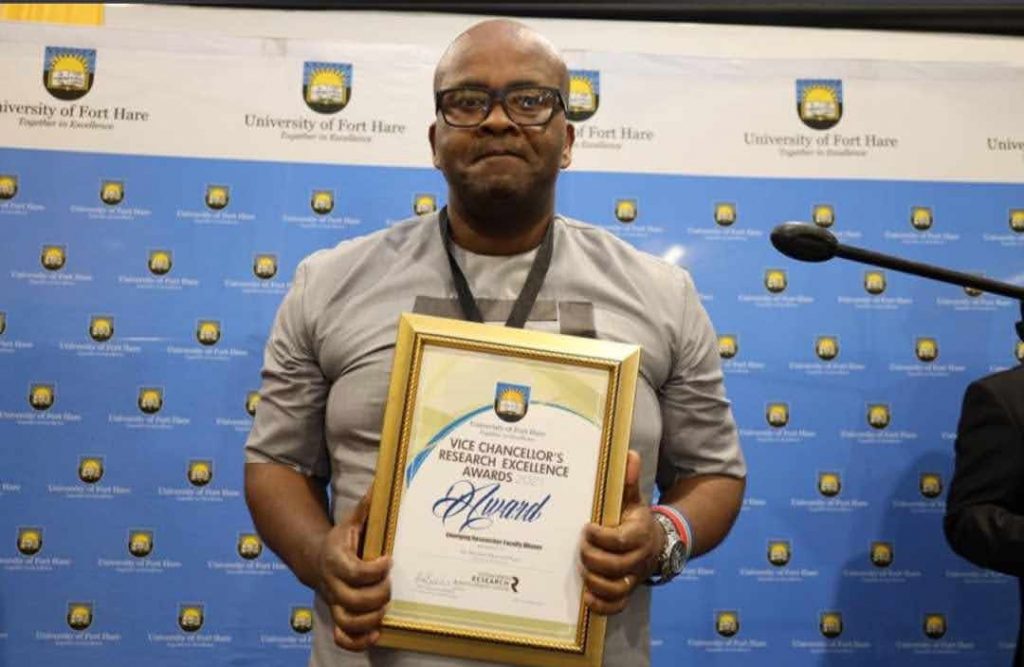
Below I am presenting at Leeds Beckett University, England in the United Kingdom, ESBB Conference upon a theme (s), “Post-Truth, Truth, Value Freedom or Inevitable Bias? What do Publish Academic Texts Tell us about the Meanings of ‘Objectivity’ and ‘Subjectivity’’ (Nunn, 2018)
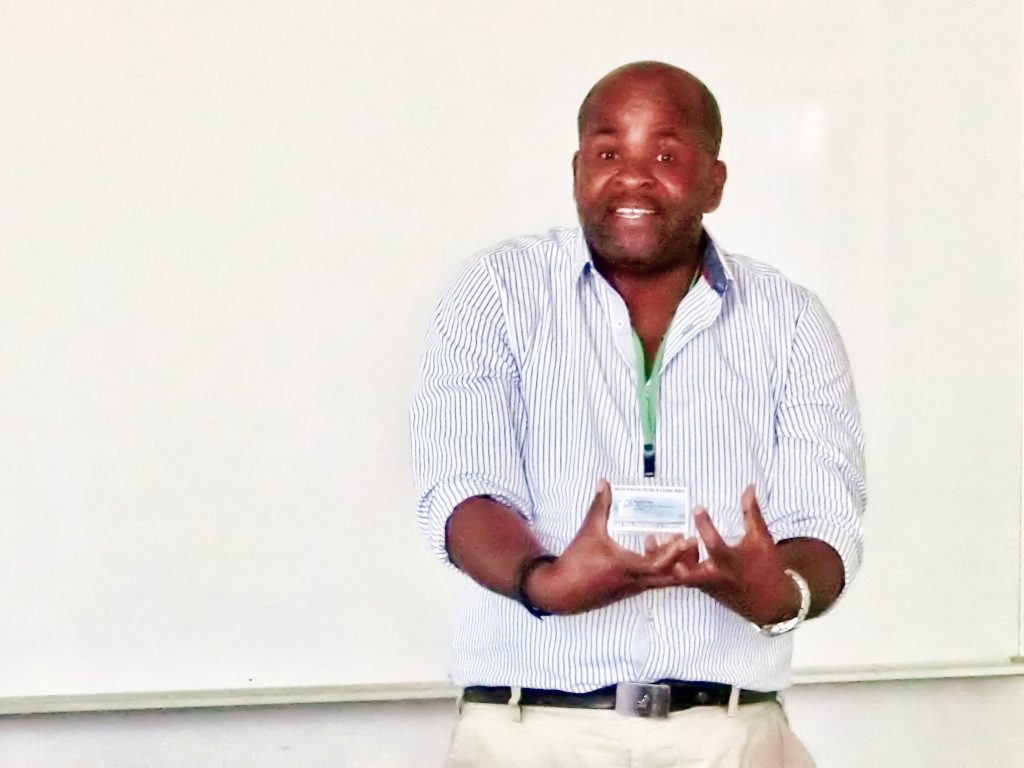
OBJECTIVE:
I am an education Specialist, and researcher in sociolinguistics and Language-in-Education Policy. A senior lecturer, Teacher/ scholar, language development specialist, reflexive practitioner, reviewer & editor.
I received the Research Excellence Award on this day, November 18, 2021, on behalf of the faculty of education.
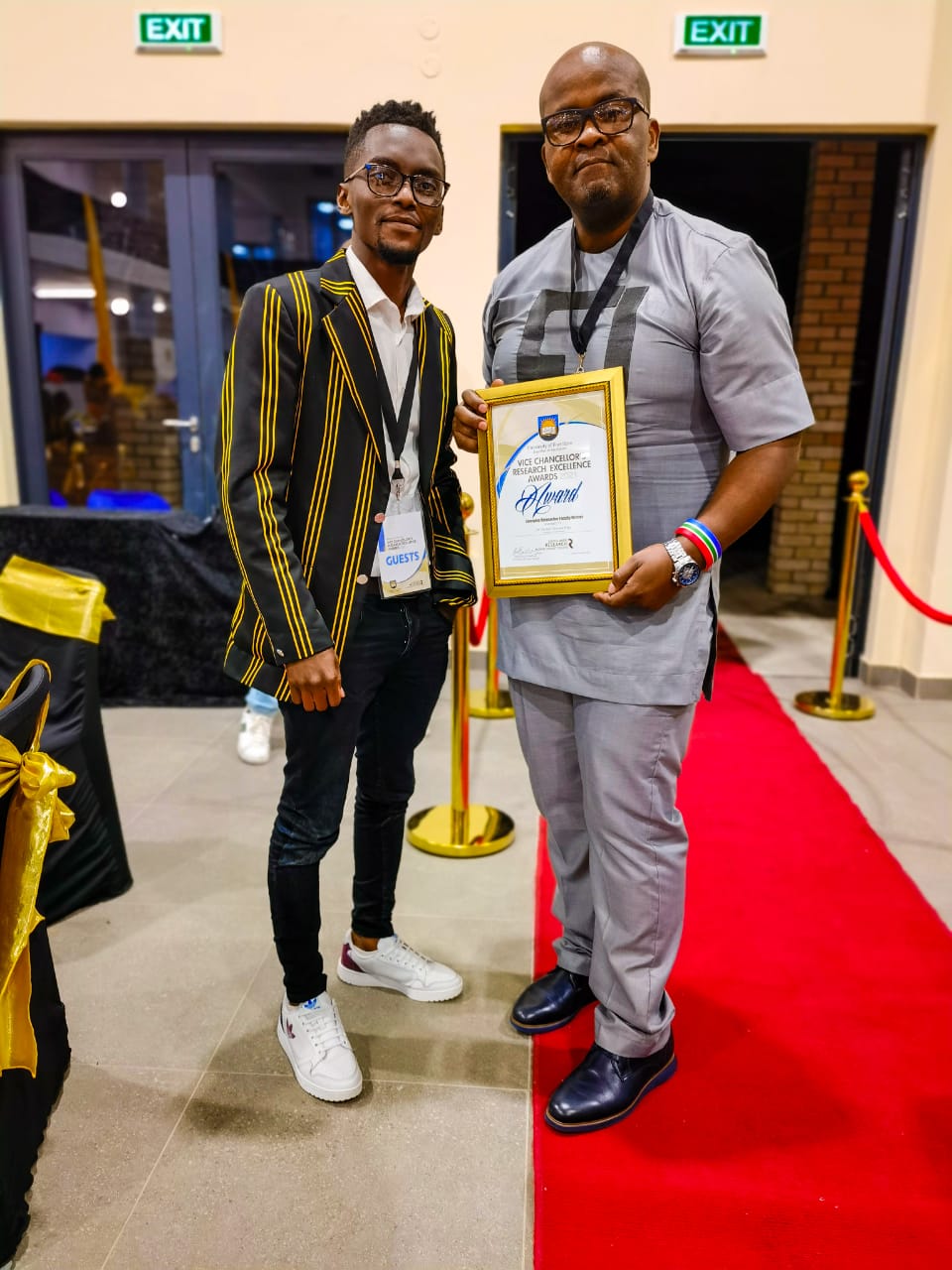
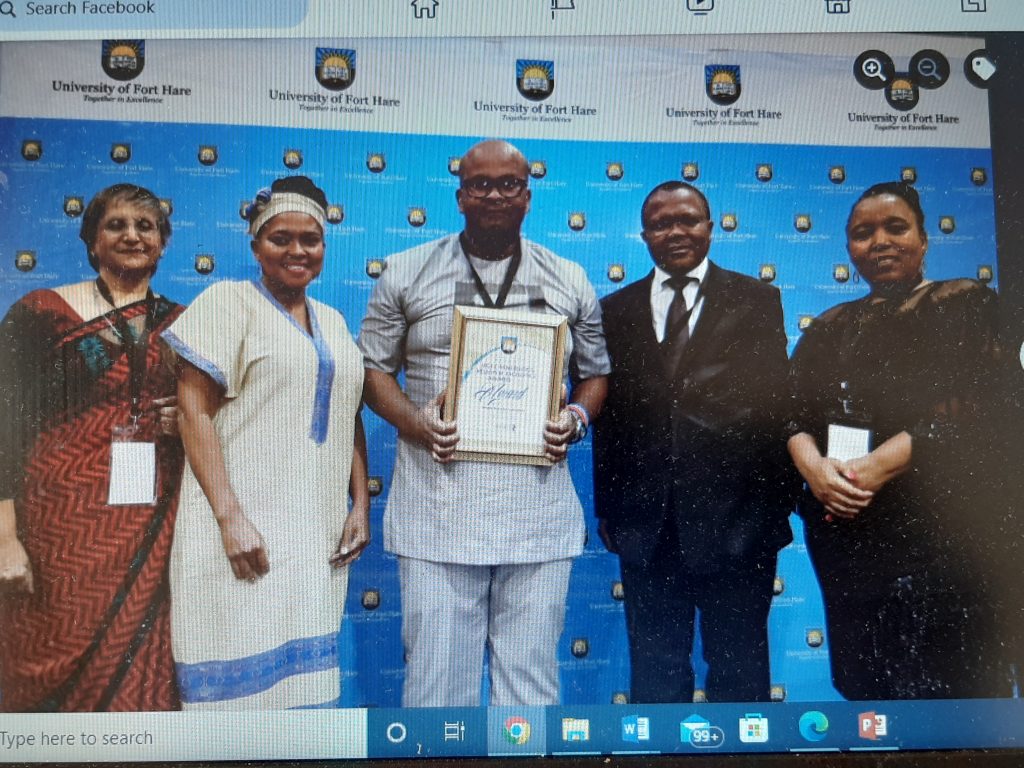
It goes without saying that I have contributed to both the SADC and the global community. The 2nd Deutsche Gesellschaft für Internationale Zusammenarbeit/ GIZ GmbH Eastern and Southern Africa (ESA) Transnational Learning Conference, which will take place in Pretoria from October 25–27, 2017, will make one such historical contribution. Take a look below:
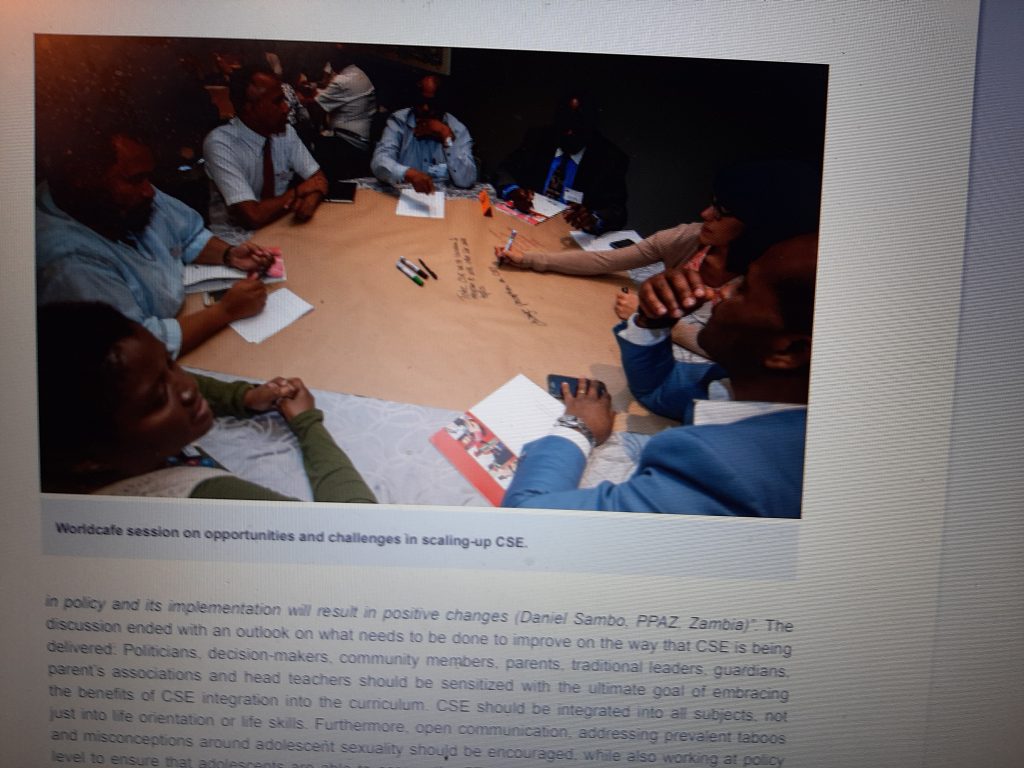
At the above conference, 20 Countries in the ESA region endorsed the ESA Ministerial Commitment to delivering quality Comprehensive Sexuality Education and Sexual Reproductive Health Services for Adolescents and Young People. As educationists and academics, we discussed the possibilities of integrating these matters into the curriculum.
Following this conference, the Eastern Cape Department of Education (ECDoE) School of Health & Social Planning awarded me a certificate of commendable service for my published inputs at the conference, as appears below in the group discussion on opportunities and challenges in scaling -Comprehensive Sexuality Education (Second ESA TL Conference, PP28 & 38).
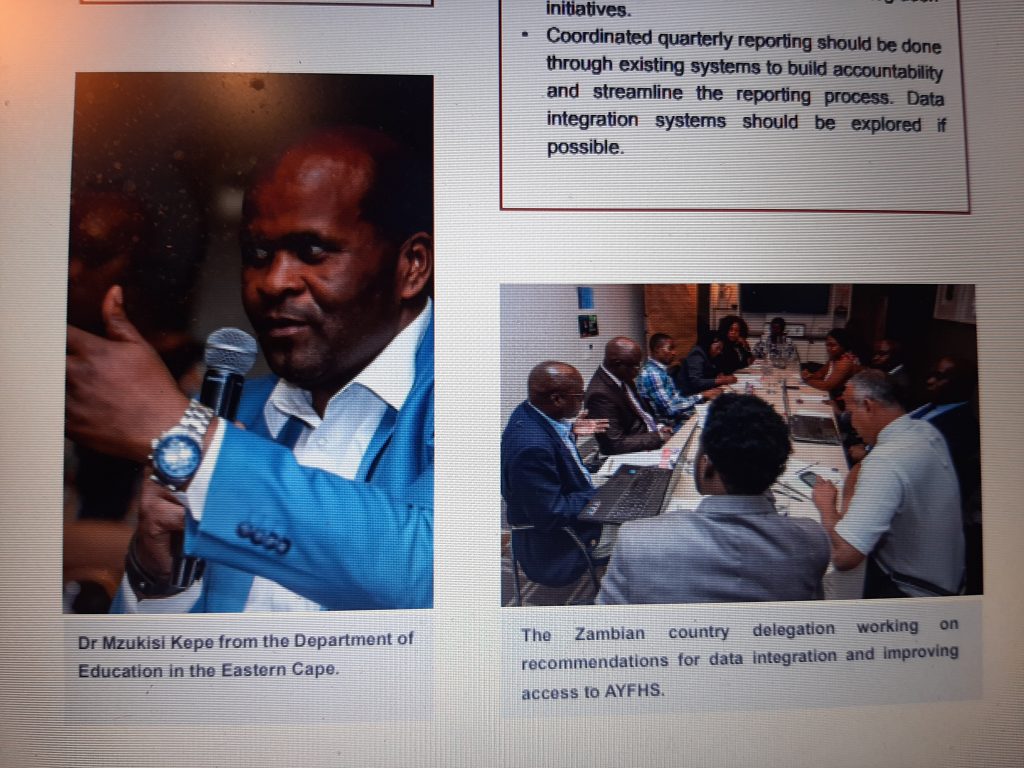
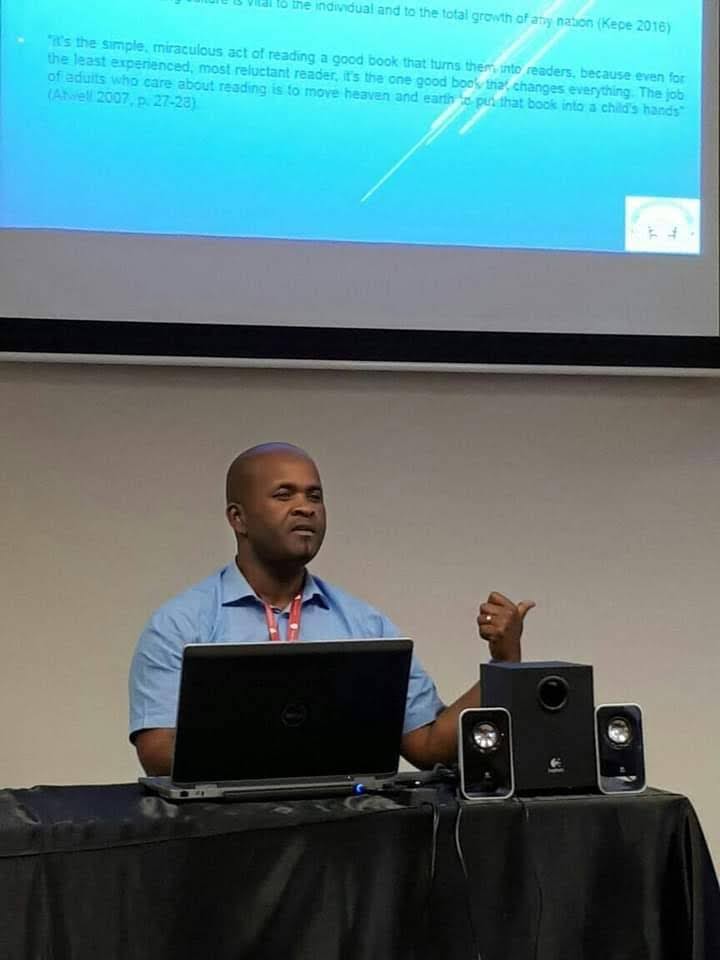
Gauteng, themed, Rethinking literacy and pedagogic agency
in the 4th Industrial Revolution
In my early years of teaching, my passion for reading ascended from ISEA Rhodes University (2009), at that time I was also teaching at Toise High School, where I assisted in starting a reading club for the first time, in 2011 in that school. It has had a significant impact on the learners then and improved their marks in all subject areas. I concentrated on students in grades 10 A and B who were struggling with reading and writing abilities in EFAL. To support these classes, I used to take them to the neighbourhood library and museum in King Williams Town between 2010 and 2011. Because the reading club was making the school famous, the school was covering the cost of bus tickets. The Bulembu project comes shortly after that.
When I was a teacher at Tois High School in 2010

Mr Mandithi at the King Williams Town Museum.
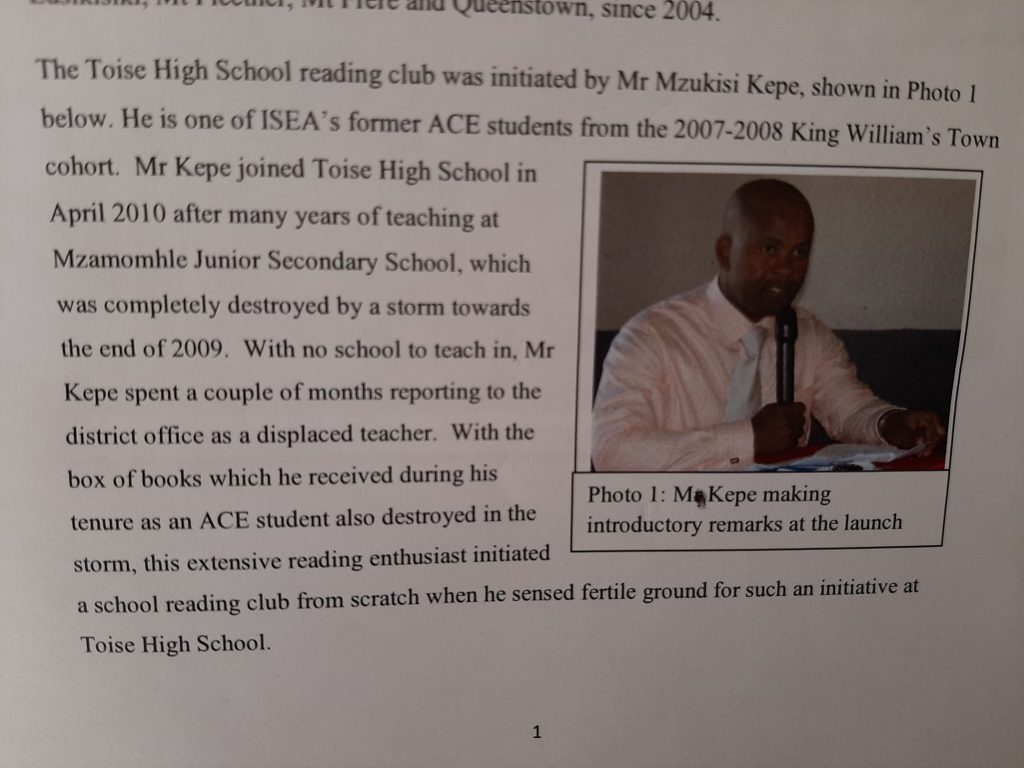
The occasion was captured onto a CD.
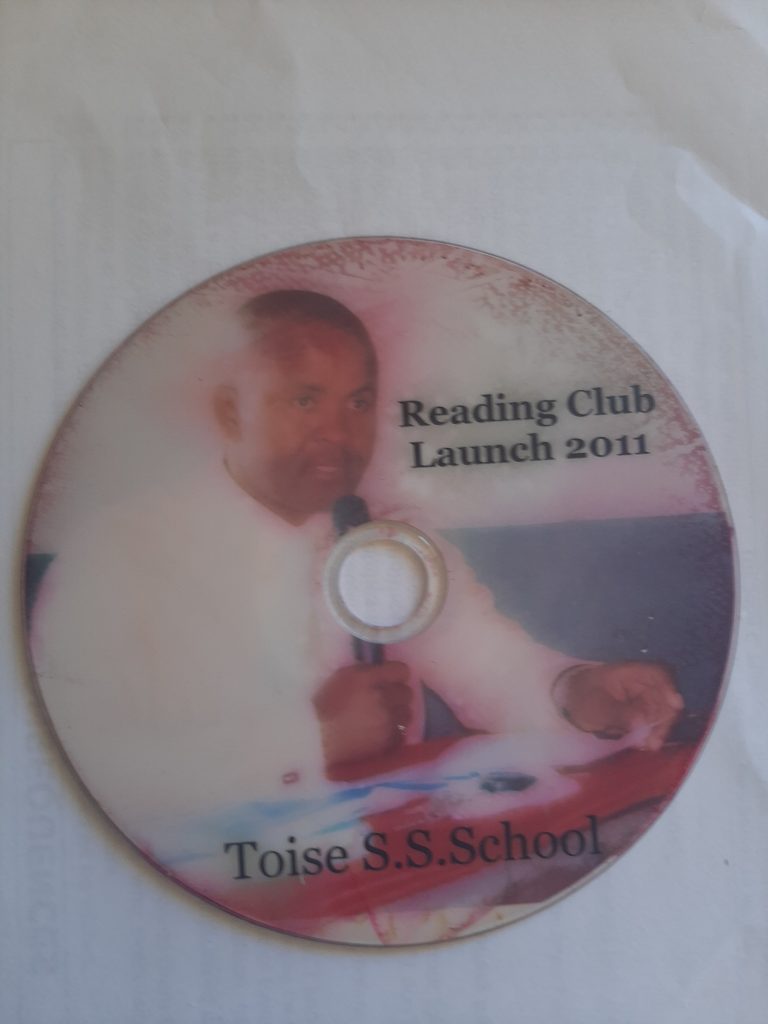
A Toise High School hallway that was packed to the gills. The majority of the students were in the crowd, which was larger than it could accommodate due to outside observers looking through the windows.
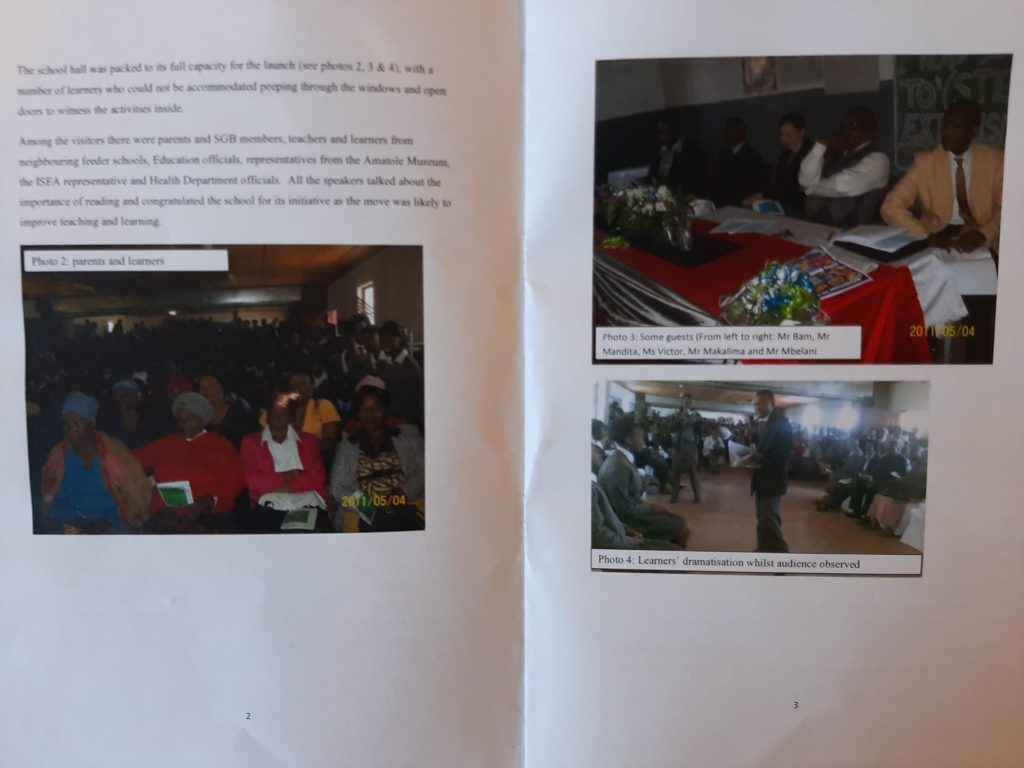
A huge turn-up on the day of this launch.
Multimodal Classroom discourse at Toise High in-person interaction
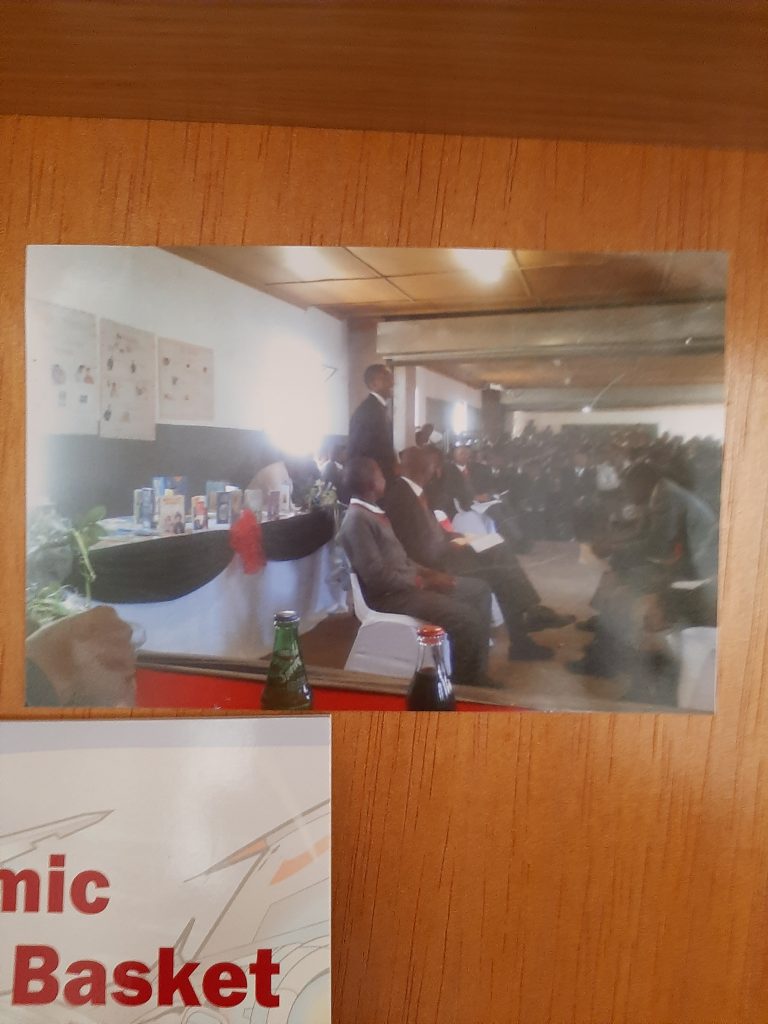
Book narration and discussion.
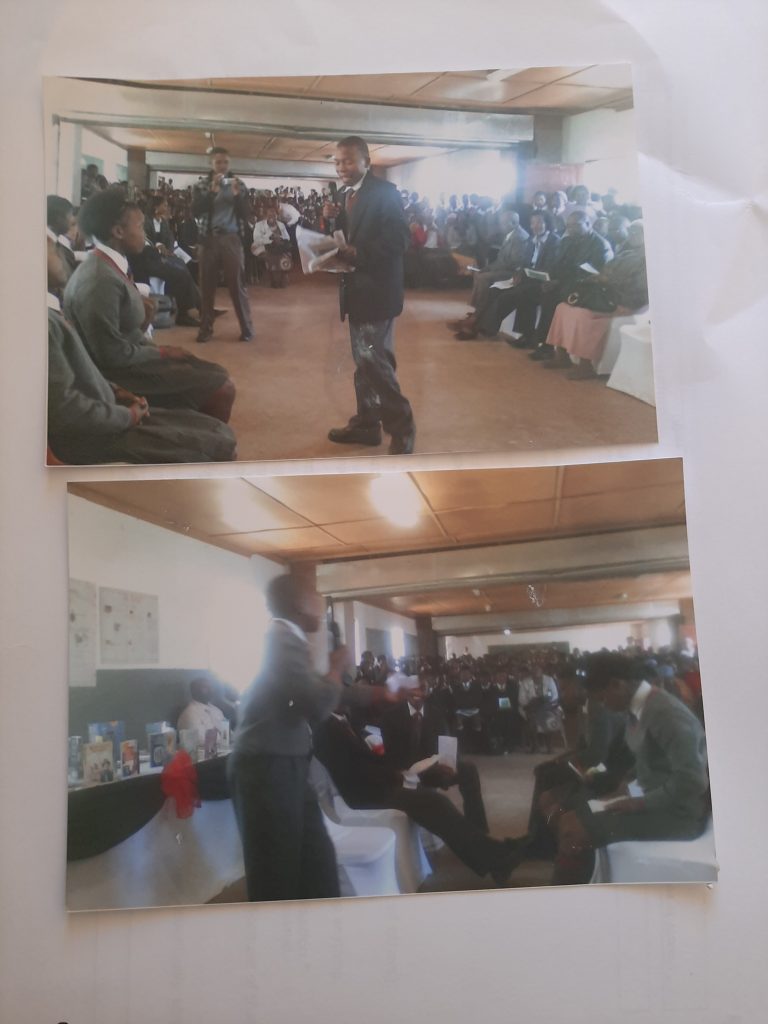
Book display table
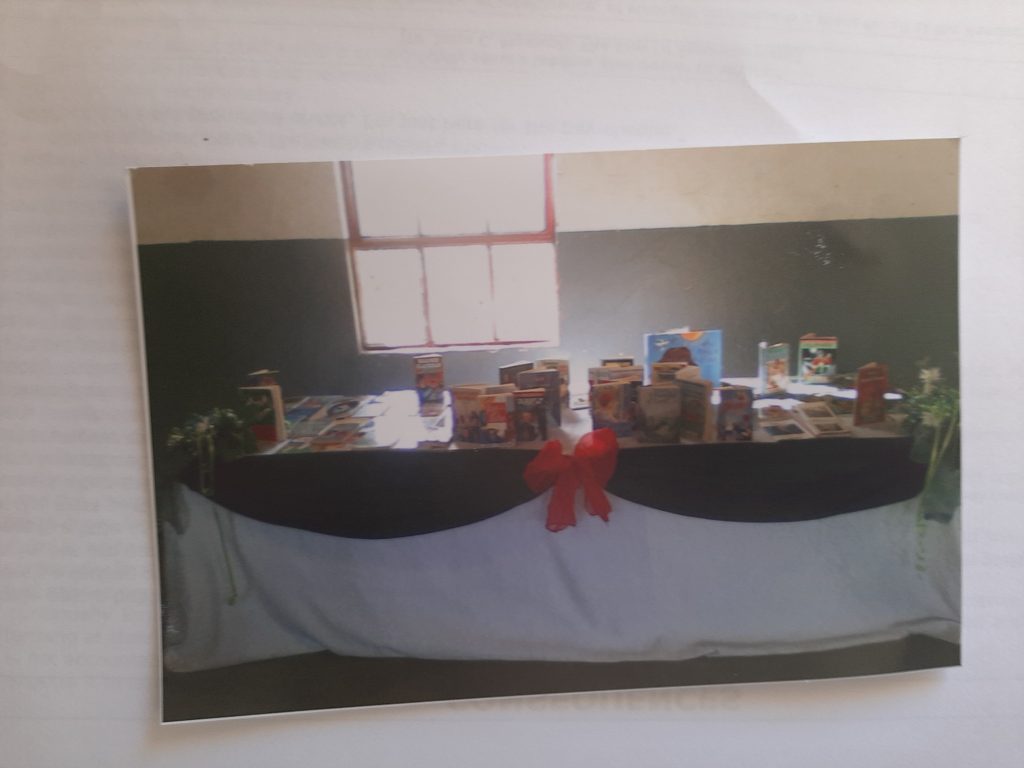
Putting on display books that are appealing, current, and suitable for students’ ages might encourage independent reading. As a result, the students would arrive at the display table eager to choose books. Assisted by the monitor(s) of the classroom library that they (learners) have chosen. This was done to prevent chaos during the book selection process, and at the same time, it was important to assign tasks in order to foster a sense of ownership and responsibility for the upkeeping of the books.
As Nancy correctly stated,
for students of every ability and background, it is the simply miraculous act of reading a good book that turns them into readers. The job of adults who care about reading is to move heaven and earth to put that book into a child’s hands― (Atwell, 2006).
The gallery below shows a poster presentation, one of the cutting-edge activities they liked, designing the genre of the poster.
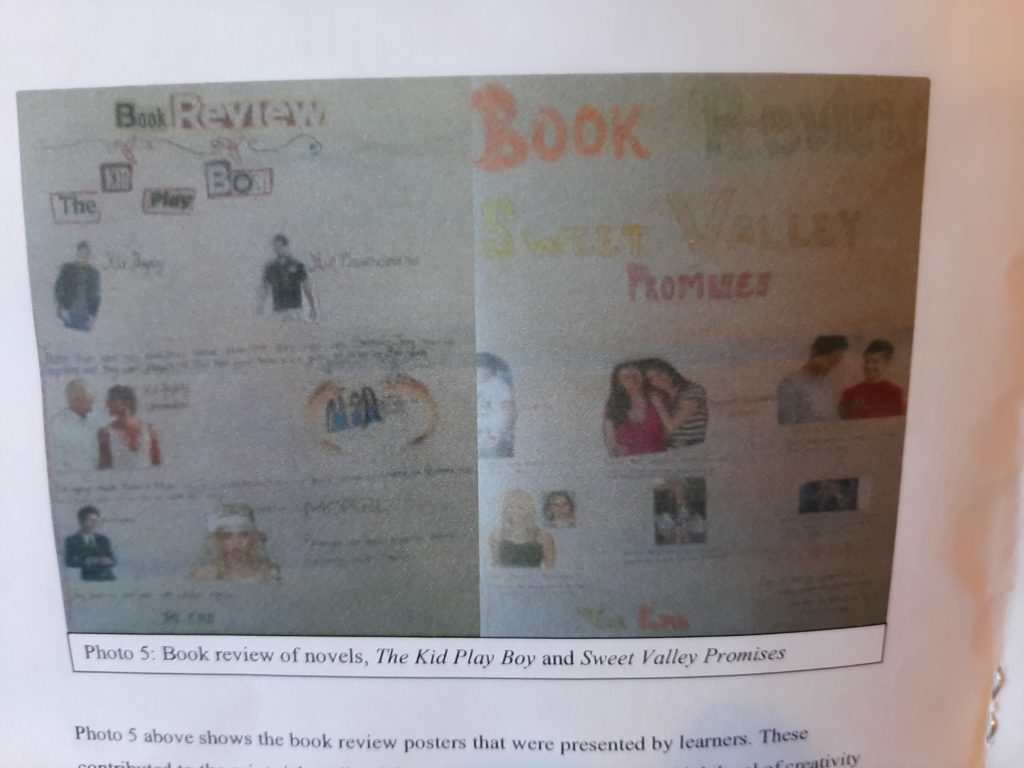
Reading for the love of it!
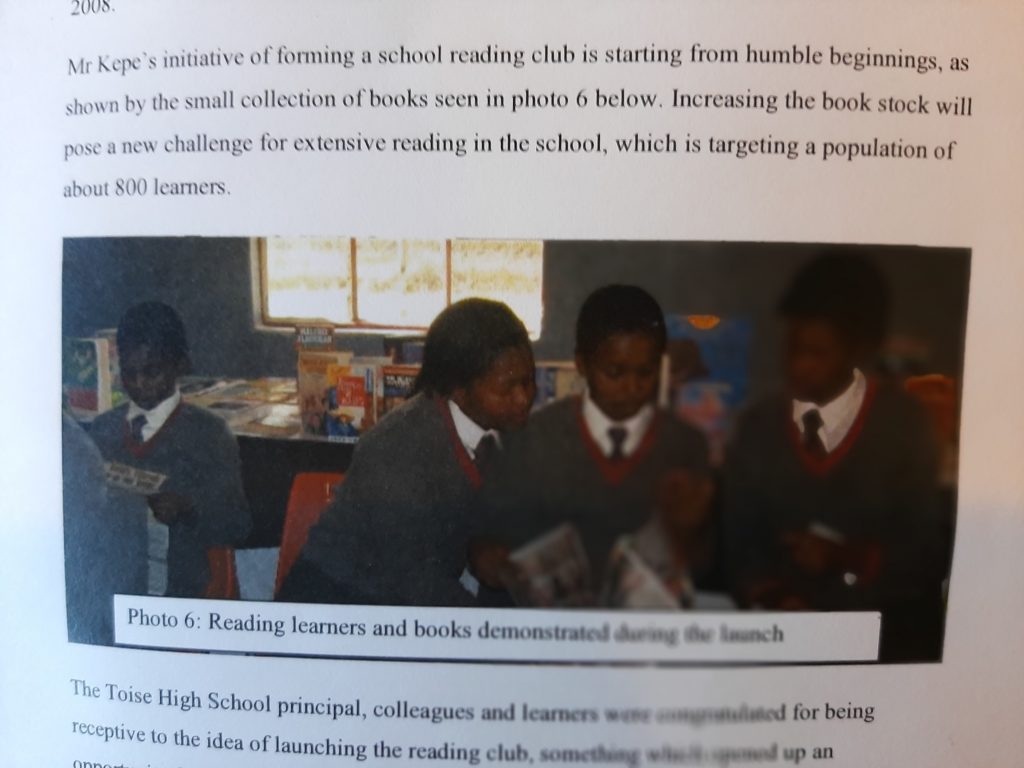
Through these endeavours, I am aiming to convey the one notion that reading a lot helps students write better than those who do not.
The all-time gallery below shows me boarding the bullet train from Tokyo Metropolis (Japanese: 東京都, Tōkyō-to Toyama University ESBB Conference 2019
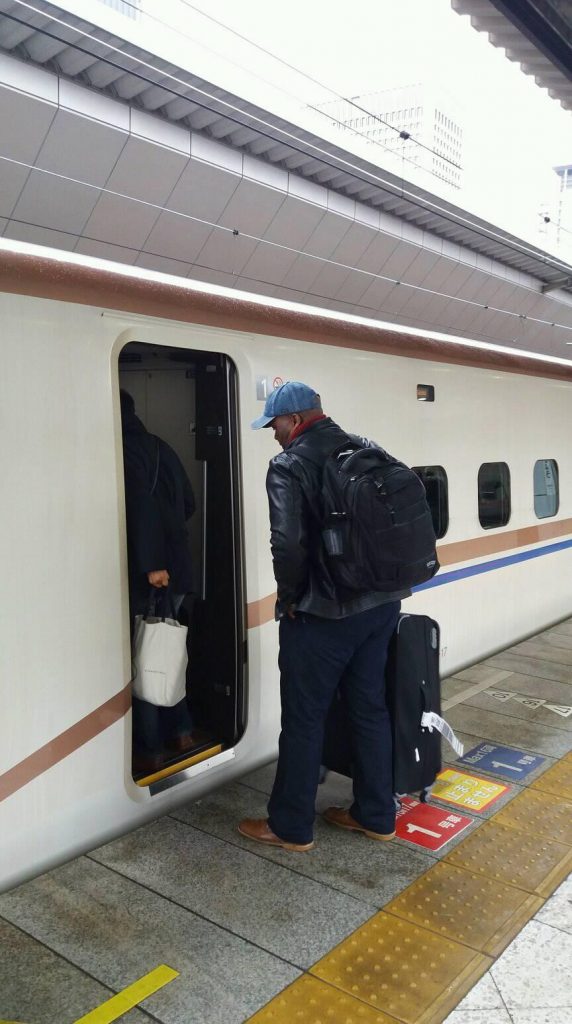
The photo below shows my book chapter, titled: Challenges Encountered by Teachers in Reading in EFAL classrooms in South African Schools
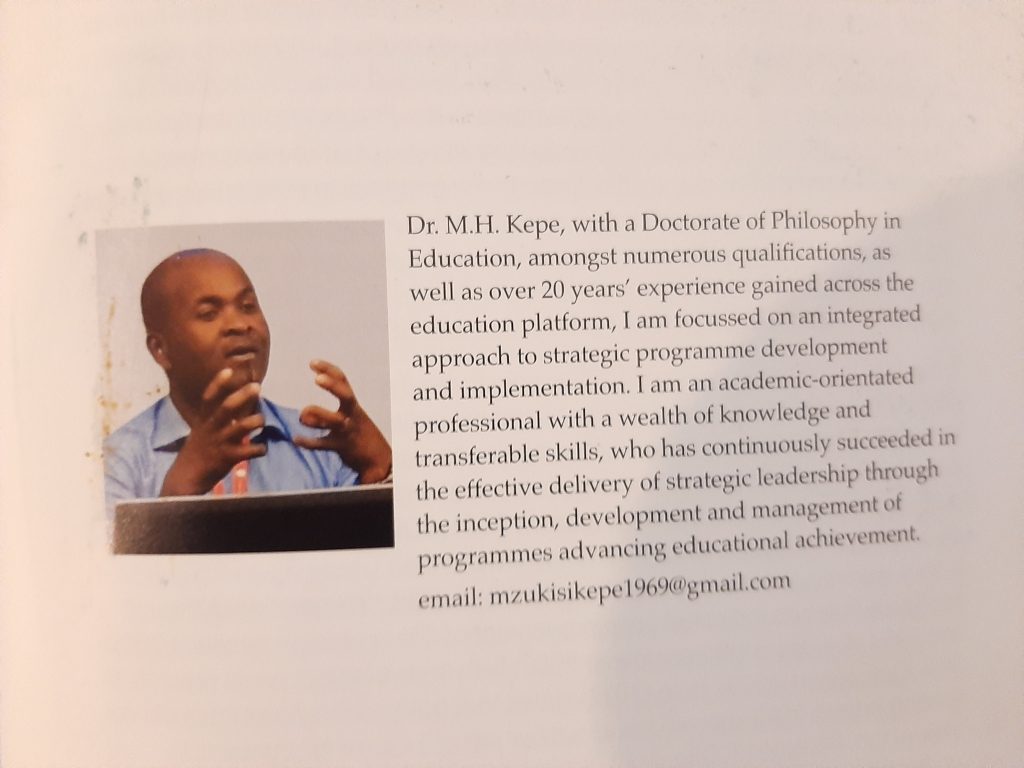
Below I am Spain, presenting my paper:
Teaching the EFAL as a lingua franca to culturally diverse learners in a South African School
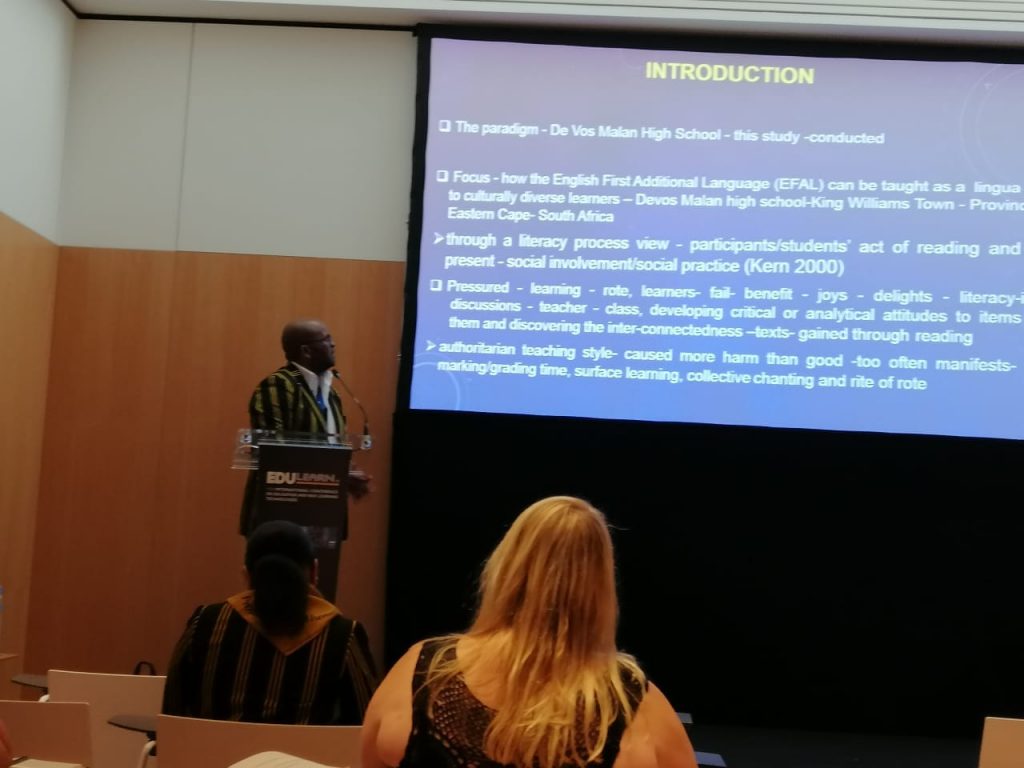
Below I present my poster in Spain- 2019
My paper: Translanguaging in the Culturally Diverse Classrooms of a South African School: Towards Improving Academic Success and Literacy Competencies, a Paradigm Shift to Translingualism?
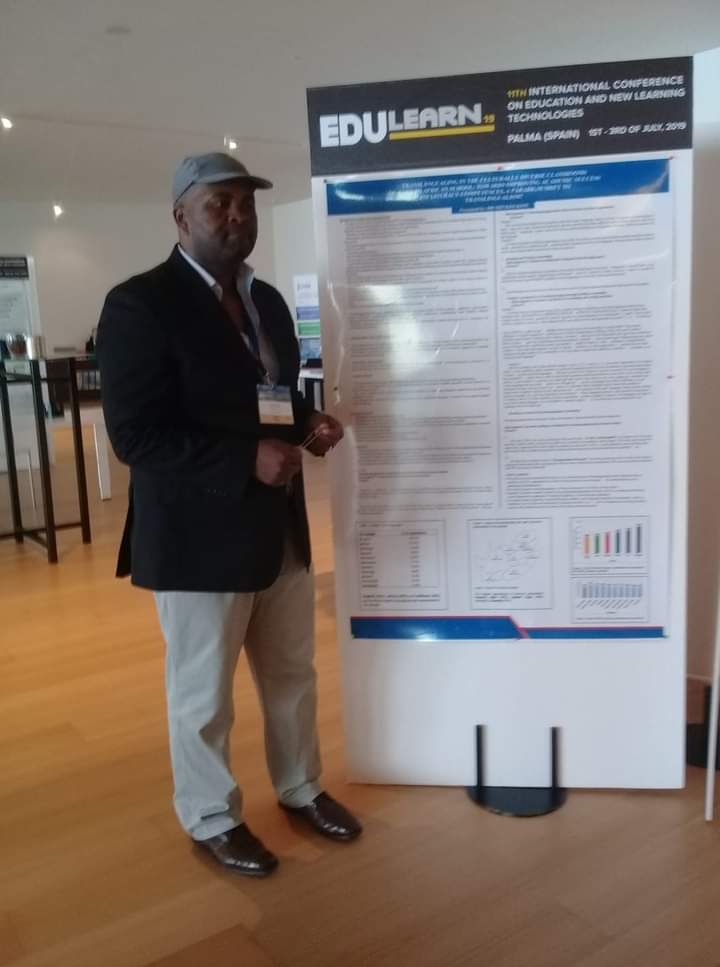
Cite it as
Mzukisi Howard Kepe (2021): Translanguaging in the Culturally Diverse Classrooms of a South African School: Towards Improving Academic Success and Literacy Competencies, a Paradigm Shift to Translingualism? English Scholarship Beyond Borders (5)1, 81-121. (ISSN 2410- 9096, Scopus indexed). https://doi.org/10.6084/m9.figshare.17163590.
Kepe, M., & Linake, M. (2019). Teaching English as social practice: A practical guide. South African Journal of Higher Education, 33(5), 146-168. DOI: 10.20853/33-5-3600
https://doi.org/10.6084/m9.figshare.17163554.v1
Modelling reading!
I made sure to motivate others by reading as an example. I had to appear to be a reader as well. occasionally, even making a show of doing it.
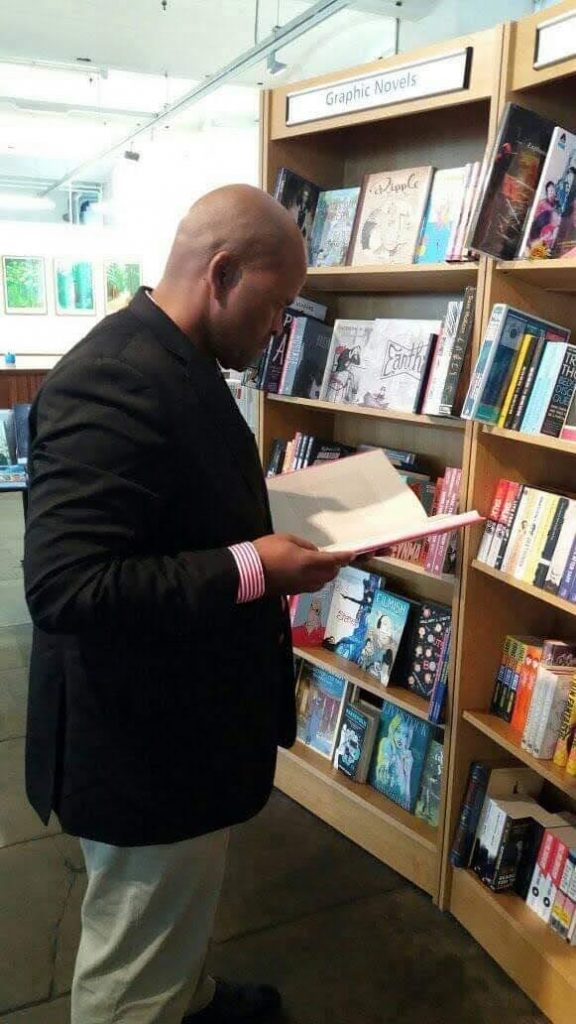
45th 2018 conference of SASE- CPUT at Lagoon Beach Hotel, Cape Town
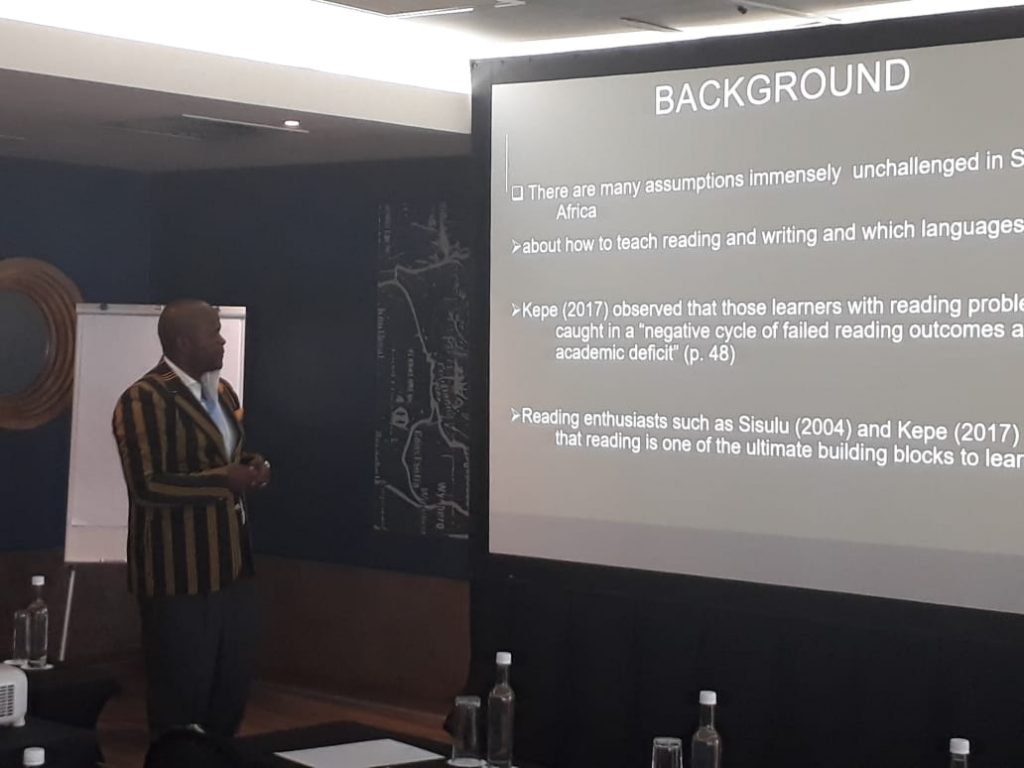
The photo below shows my snapshot taken just after my presentation at the 12th Annual Conference of the Literacy Association of South Africa (LITASA). 034-281-NPO @ Kgorong Building, UNISA Muckleneuk Campus Pretoria, upon a theme Literacy and Inclusivity: Crossing boundaries and creating networks13 – 15 October 2017.
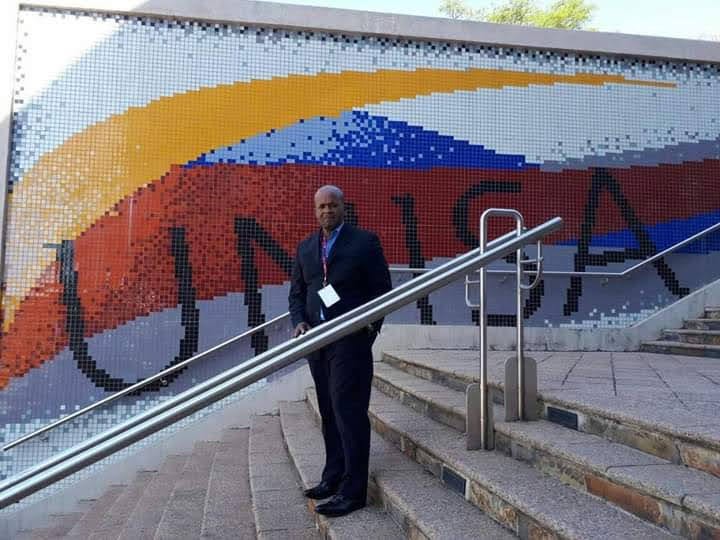
12th Annual RASA Conference Literacy and Inclusivity 13 – 15 October 2017 Kgorong Building, Unisa, Pretoria.
The image below puts the idea of international translatability into perspective by illuminating a conversational multimodal exchange. Typical classroom conversation at the University of Toyama in Japan, mediated by Professor John Unger of the United States and other academics from various nations.
Prof. John Unger mediating and leading the discourse!

I started my teaching career in the Province of the Eastern Cape, South Africa in 1995. I have worked non-stop since then. I am recognised for promoting reading for the love of it, formally referred to in scholarship as reading culture or extensive reading by some. I instil a culture of reading in students but I am also a reading enthusiast myself. I am currently reading two startling novels by South African leading writers Zakes Mda’s Heart of Redness and Siphiwo Mahola’s When a Man Cries and his Can Themba: The Making and Breaking of the Intellectual Tsotsi, a Biography. Also, Mbeki’s biography, titled The Thabo Mbeki I Know, was authored by Mahmood Mamdani, editor by Sifiso Mxolisi Ndlovu and Miranda Strydom.

Bernstein, B. 1971. Open schools, open society? In B R Cosin et al (eds). School and society: a sociological reader. Cambridge, Massachusetts: MIT Press, 66-69.
Why Bulembu L & H Primary School?
School Social Context: the Bulembu L/H Primary School context mirrors the South African education context in which — despite the curriculum changes following the demise of Apartheid in 1994 — most public schools to date still use English or Afrikaans as a language of learning and teaching. The language of learning and teaching at the school from Reception/Grade 1 is Isixhosa (mother language); however, English is introduced as the First Additional Language (EFAL) in Grade 4 to Grade 7, which is the exit point. The sentiments around the location of the school are tied to my growth and early life at the school, I was a pupil there from Grades 1 to 6 in my early formative years. It is an ongoing literacy initiative for this marginalised community, which benefits currently around ninety-four pupils from Grades 4 to 6.
The rationale
Teachers reported that students, in general, do not study enough; especially, the intermediate phase lacks vocabulary and most importantly is unable to read aloud and with meaning, including the ability to write competently. They noted that although intermediate-phase students are unable to read independently, they appear to enjoy reading while mimicking the teacher.
Where is the site located?
The Bulembu Lower/Higher Primary School is 12 km away west of King Williams Town in Buffalo City Municipality in the Province of the Eastern Cape, South Africa. The school emerged from a disadvantaged community where unemployment is rife, education levels are low, and drug and alcohol use proliferate.
Results:
Having launched the extensive reading project and implemented it at the school, the teacher that I worked with Ms Nqadala opines that,
having started this programme, things are not the same anymore. They [pupils] enjoy reading. Reading has improved their skills: listening, writing, cooperation, responsibility, self-confidence and public speaking. The programme had an incredible impact as pupils’ confidence is now up, and now I can say we are working on motivating a few that are remaining behind. As we speak, I have received comments from a few parents who are observing them doing their work, reading, writing and working on their own without the teacher during this Lockdown. One of the parents even said, “phambili [forward] Bulembu.” As a confirmation of this, the Term One tasks set by the clusters from Grade 4 to 7 were very easy for them to answer, whereas they were struggling before. I can say the project has achieved its objectives.
Results: The project has previously shown that EFL students’ communication abilities, academic reading skills, and writing proficiency will all increase if they read age-appropriate, appealing, current literature and use different reading strategies.
In the image below, you can see a group of ER fans preparing with their arts and culture teacher to drum the majorettes to welcome guests on the big day of the debut on October 24, 2019.

The image below depicts the audience being mesmerized by the participants, benefactors, and learners during what I referred to as the “great” language argument on the day of the launch on October 24, 2019.

The debaters were arranged in a horseshoe shape and prepared to begin the big language debate, a pressing subject in South Africa. The literacy tutors, who are positioned on the far left and are dressed in black shirts and red aprons, serve as the school’s emergency response personnel because I am a lecturer and am therefore unable to attend every day.
The ER learners in the picture below look happy and jubilant while enjoying a fantastic theatre play.


